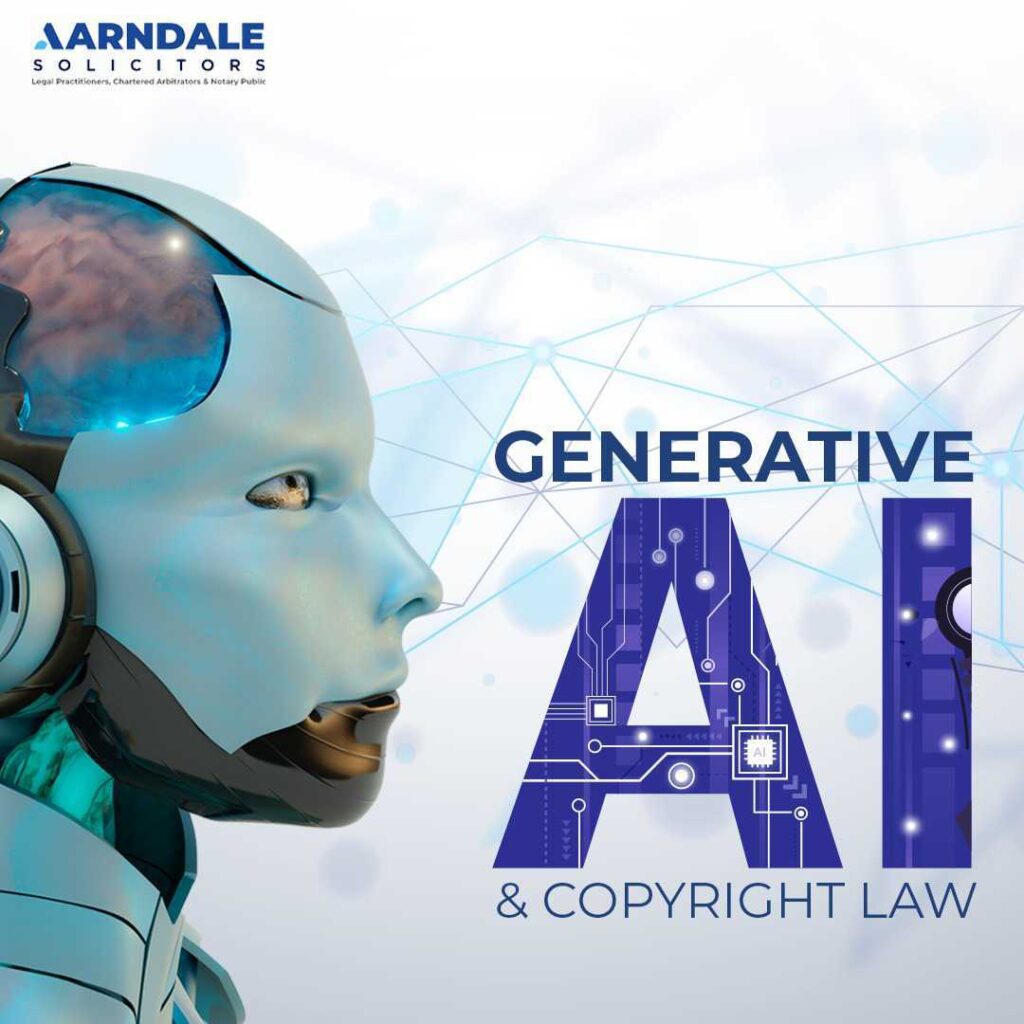

Since 2010, the Global Law Experts annual awards have been celebrating excellence, innovation and performance across the legal communities from around the world.
posted 2 months ago
It is the age of Artificial Intelligence (AI), and inventions such as Chat GPT, DALL-E, Midjourney, Bard, and DeepMind have taken the world by storm. Their uses range from writing essays for students to generating realistic drawings and corporate headshots. While this is an exciting new development, it comes with a slew of issues that the legal world is scrambling to address. But can the products of this low-effort creative venture be copyrighted? And what happens when AI infringes the copyright of human-generated work?
Generative AI is a program that creates works in accordance with prompts from a user. Pictures, drawings, literary works, and even virtual worlds can be “generated” from this software. This low-effort tool has now become a facility through which anyone can be creative.
It is trained on large sets of data, and taught to identify patterns among them, and to create new and original data based on what it has learned: “new, unseen before samples that are not identical to but have the same characteristics as the input data[1]”. It is, for example, trained on hundreds of books, so that it can, ideally, produce the same quality of books as pertains to diction, plot strength, and imagination.
According to the US Copyright Office[2]:
“Copyright is a type of intellectual property that protects original works of authorship as soon as an author fixes the work in a tangible form of expression. In copyright law, there are different types of works, including paintings, photographs, illustrations, musical compositions, sound recordings, computer programs, books, poems, blog posts, movies, architectural works, plays, and so much more!”
The term “Copyright” refers to several rights that accrue to the author of an original literary work, that enables such author to control its use, distribution, and monetization among others. The duration of a copyright is the duration of the author’s life plus 70 years after his death[3].
According to the US Courts – No!
The bid of Stephen Thaler, author of the Creativity Machine, to copyright his AI-generated picture “A Recent to Entrance Paradise”- a part of a series depicting images about the afterlife, which had been earlier rejected by the US Copyright Office came to a head at a US Federal Court on August 18, 2023, where the presiding Judge, Beryl A. Howell held that “the defendants ( the US Copyright Office) are correct that human authorship is an essential part of a valid copyright claim[4]”. The Judge further stated “Copyright has never stretched so far, however, as to protect works generated by new forms of technology operating absent any guiding human hand[5],”
This is not to say, however, that all AI-generated work is automatically excluded from copyright protection- it simply means that a person seeking to copyright an AI-generated image must have shown that he or she has exercised sufficient human effort in the creation of the work.
This quote from Dr. Andres Guadamuz, the editor-in-chief of the Journal of World Intellectual Property – may shed more light on the term ‘sufficient human effort’: “If you type “cat by van Gogh,” I don’t think that’s enough to get copyright in the US,” he says. “But if you start experimenting with prompts and produce several images and start fine-tuning your images, start using seeds, and start engineering a little more, I can totally see that being protected by copyright.[6]”
In recent times, authors have instituted actions against Open AI, a private research laboratory that aims to develop AI to benefit humanity, and the creator of Chat GPT (generative AI that creates blocks of text like essays, ad copy, etc) claiming that not only were their works used to train Chat GPT, it was also plagiarizing their works while trying to produce its original works. Instances such as users trying to generate sequels and spinoffs to their favourite books have brought the conflict to the point of litigation by several famous authors.
The American Authors Guild and 17 other authors filed a lawsuit against Open AI for: copying their work wholesale, without permission or consideration, and feeding the copyrighted materials into large language models, which could lead to the creation of derivative works of fiction that are based on, mimics, summarizes or paraphrases their books. Additionally, these authors claimed that AI is being trained with pirated copies of their books.
Similar suits have sprung up throughout the year 2023, alleging similar claims against generative AI [7] [8].
There have also been reports that image-generating AI such as Midjourney, Stable Diffusion, and Dall-E are being used to generate images in the style of living artists, therefore, devaluing their human effort – the years it took the artists to formulate that style. These artists reason that this new development may displace them and their work due to how easy it is to replicate. More worrying is that US Copyright law does not sanction copying an artist’s style, it only sanctions replicating his work.
The Copyright Act 2022 does not refer to Generative AI, however, a close analysis seems to indicate an emphasis that could have bearing on any AI-generated work-related matter, – human effort. This requirement is very similar to the position of the US Copyright Office. According to s2(2) of the Act:
(2) Notwithstanding the provision of subsection (1), literary, musical or artistic work shall not be eligible for copyright unless — (a) some effort has been expended on making the work, to give it an original character ; and (b) the work has been fixed in any medium of expression known or later to be developed, from which it can be perceived, reproduced or otherwise communicated either directly or with the aid of any machine or device.
As seen above, section 2(2)(a) provides that for copyright to exist in a work, the author of a literary, musical or artistic work must have expended some effort in its creation, to give it an original character. The requirement in Section 2 (2) (b) that the work be fixed in any medium known or later to be developed is a proviso that directly accommodates AI-generated works.
The Nigerian Courts have not had the opportunity to dissect any matters regarding generative AI, but it is foreseeable that the courts will, in determining any future cases along the line of generative AI, adopt international standards and best practices regarding this matter.
The good news is, for one’s copyright to subsist, the work need only be in existence (or fixed). However, to establish ownership, true publisher, originality, place of creation, and priority of creation, it is advised that creatives register their copyright with the National Copyright Commission, as section 43 of the Copyright Act provides that in an action for infringement of copyright, it will be presumed that:
a) copyright subsists in the registered work;
b) that the author on the work is the real author;
c) that the publisher of the work is the real publisher;
d) that the work is original – if the author is dead; and
e) that it was published or produced at the place or on a date appearing on the work.
The age of artificial intelligence is here, and with its birth, new prospects and new problems are emerging. As the law struggles to adapt to this novel world of AI inventions and its implications, one hopes that it catches up fast, as the current unregulated state of Generative AI will continue to endanger the livelihoods of and benefit unjustly from the hard work of human authors.
Read more on our website: https://aarndalelaw.com/generative-ai-and-copyright-law
[1] R. Dangi “Generative AI, Simplified!” Available at https://www.linkedin.com/pulse/generative-ai-simplified-rajesh-dangi (accessed 13 October 2023)
[2] the US Copyright Office “What is Copyright?” Available at https://www.copyright.gov/what-is-copyright/ (accessed 6 October 2023)
[3] Ibid, at 1
[4] Z. Guy “AI-Generated Art Is Not Copyrightable, Judge Rules” Available at https://www.vulture.com/2023/08/ai-art-copyright ineligible.html#:~:text=Go%20on%2C%20make%20all%20the,beings%2C%20per%20The%20Hollywood%20Reporter. (accessed 6 October 2023)
[5] Ibid, at 3
[6] Seen in J. Vincent, “The scary truth about AI copyright is nobody knows what will happen next” available at https://www.theverge.com/23444685/generative-ai-copyright-infringement-legal-fair-use-training-data (accessed 6 October 2023)
[7] W. Davies “Sarah Silverman is suing OpenAI and Meta for copyright infringement” Available at https://www.theverge.com/2023/7/9/23788741/sarah-silverman-openai-meta-chatgpt-llama-copyright-infringement-chatbots-artificial-intelligence-ai (accessed 9 October 2023)
[8] E. Roth “Another group of writers is suing OpenAI over copyright claims” Available at https://www.theverge.com/2023/9/11/23869145/writers-sue-openai-chatgpt-copyright-claims ( accessed 11 October 2023)
Author


There are no results matching your search.
Resetposted 5 hours ago
posted 17 hours ago
posted 17 hours ago
posted 4 days ago
posted 4 days ago
posted 4 days ago
posted 5 days ago
There are no results matching your search.
ResetSign up for the latest advisory briefings and news within Global Advisory Experts’ community, as well as a whole host of features, editorial and conference updates direct to your email inbox.
Naturally you can unsubscribe at any time.
Global Advisory Experts is dedicated to providing exceptional advisory services to clients around the world. With a vast network of highly skilled and experienced advisers, we are committed to delivering innovative and tailored solutions to meet the diverse needs of our clients in various jurisdictions.